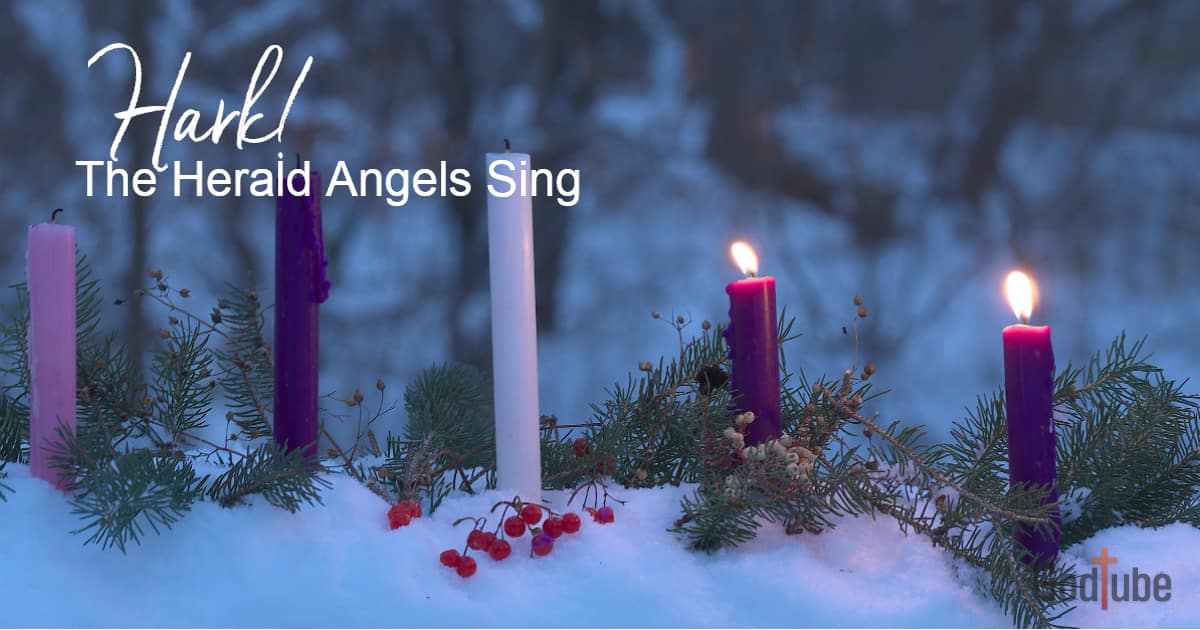Hark The Herald Angel Sing – Song Overview
Hark the Herald Angel Sing is a memorable Christmas church hymnal that is a staple of religious services and worship.
In 1847, William Cummings, just sixteen years old, was singing one of the tenor leads in Felix Mendelssohn’s opera Elijah. For the young tenor, to be directed by one of the most renowned composers in the world was a dream come true. It is little wonder that that night made an indelible impression on Cummings and ultimately gave birth to a marvelous duo of lyric and melody.
Almost three decades before Cummings was born, England’s premier Christian poet and songwriter, Charles Wesley, died at the age of seventy. Wesley, the youngest of eighteen children, wrote more than three thousand hymns, many of which – such as “Jesus Christ in Risen Today” and “Love Divine All Loves Excelling” – are still sung by millions. Yet the life and work of the man still remembered today as one of the greatest hymn writers in history could have been much different. If not for a dispute with an employer, Wesley’s contributions to both music and the establishment of a Christian movement might never have happened.

Hark The Herald Angel Sing – Charles Wesley
Wesley began his formal education at the Westminster school in 1716. He then studied at Christ College in Oxford In 1735, at the age of twenty-eight. Charles sailed for Georgia to become secretary to General James Oglethorpe. In short order, Wesley found himself missing his home and family and feeling stifled in his new role. In less than a year he quit his job and returned to London.
Assigned to a church in Islington, England, Wesley immediately began making waves. His outlook was radically different from most other English clergy of the time. He visited prisons, was a strong supporter of individual thinking, often held church services outdoors, and believed Christian music needed to be infused with heavy doses of personal witness, energy, and enthusiasm. He kept his mind sharp through daily Bible study and hours spent writing music.
In 1737, during his daily quiet time, Wesley was working on a new Christmas composition When the pastor jotted down the line, “Hark! how all the welkin rings, glory to the King of Kings.” the new song quickly fell together. Welkin, a word foreign to most today, literally means the “vault of heaven makes a long noise.” Thus, when heaven sends forth a loud pronouncement, the entire power of the King is revealed.
Set to one of the writer’s own unique melodies, “Hark! How all the Welkin Rings” premiered in Wesley’s own church and quickly gained favor with other congregations following the new Methodist movement. Naturally, the writer was pleased with the acceptance of his work. However, when his old college friend, George Whitefield, finally published the song, Wesley’s benevolent pride turned to rage.
Hark the Herald Angel Sing: George Whitefield
Whitefield, a former bartender turned Calvinist preacher, was often at theological odds with Wesley. Wesley might have been pushing for reform, but Whitefield wanted to lead a revolution. After being ordained as a priest in the Church of England, Whitefield’s fiery rhetoric and evangelical messages kept him in constant trouble with the church. Because of his militant approach, Whitefield was soon banned from the Anglican churches of his day and forced to mostly preach in privately organized, open- air meetings. From Whitefield’s informal meetings sprang the revival movement that would soon explode in the United States.
Though much more charismatic, Whitefield was not as well educated as Wesley and so his interpretation of the scriptures was a tad more liberal and not so literal. True to form, when Whitefield published Wesley’s Christmas song, he changed the words without consulting the writer. When Wesley read the new first line, “Hark! the herald angels sing.” he was incensed. Nowhere in the Bible did angels sing about the birth of Christs.
Yet because of Whitefield’s change in one line, today most people believe that Luke 2:13 refers to singing angels rather than, “A great company of the heavenly host (spiritual) beings not normally seen who watch over man appeared with the angel, praising God and saying, ‘Glory to God in the highest, and on earth peace to men on whom his favor rests.'”
As long as he lived, Wesley never sang Whitefield’s rework of his song. Yet even if the writer refused to acknowledge the change, millions around the world soon embraced singing angels in sermons, music, literature, and art. One of those was William Cummings.
The same year that Cummings sang for Felix Mendelssohn the famous composer and conductor died at the young age of thirty-eight. Mendelssohn had been born a Jew, but had adopted the Chrisitan faith as a child. Yet by and large, the composer’s music centered on the wolrld, not on his faith. Aside from a work in 1840 that gave a nod toward Johann Gutenberg, the famous Bible printer, and being influenced by Bach, Handel, Mozart, and Beethoven. Mendelssohn’s most famous composition was the enduring Midsummer Night’s Dream.
Hark the Herald Angel Sing: William Cummings Reworks the Song
In 1855, William Cummings combined Mendelssohn’s Gutenberg tribute, “Festgesang an die Knustler,” with the Whitefield rewrite, “Hark! the Herald Angels Sing.” The end result was a dramatic change unimagined by either composer.
Cummings’s arrangement of “Hark! the Herald Angels Sing” was first printed in a Methodist hymnal in 1857. Over the next few years it was adopted by other denominations and publishers. Within a decade, the new “Hark! the Herald Angels Sing” was one of the most recognized carols in the world.
The road to acceptance and fame for this Christmas carol began when misquoted verse of Scripture (Whitefield) was combined with a melody (Cummings) written to honor the man who first printed the Bible (Gutenberg). Although neither Wesley nor Mendelssohn would probably have approved of this combination of lyric and melody, it now seems appropriate that the words of a man who lived to evangelized the world for Christ (Wesley) should be tied to a tribute written for a man who invented a method of mass-producing God’s Word for all to read.

Hark the Herald Angel Sing Videos

Hark the Herald Angel Sing Lyrics
Hark! The herald angels sing
“Glory to the new-born king
Peace on earth and mercy mild
God and sinners reconciled”
Joyful all ye nations rise
Join the triumph of the skies
With angelic host proclaim
“Christ is born in Bethlehem”
Hark! The herald angels sing
“Glory to the new-born king”
Hail the heaven-born Prince of Peace!
Hail the Sun of Righteousness!
Light and life to all He brings
Risen with healing in His wings
Mild He lays His glory by
Born that man no more may die
Born to raise the sons of earth
Born to give them second birth
Hark! The herald angels sing
“Glory to the new-born king”
Hark! The herald angels sing
“Glory to the new-born king
Peace on earth and mercy mild
God and sinners reconciled”
Joyful all ye nations rise
Join the triumph of the skies
With angelic host proclaim
“Christ is born in Bethlehem”
Hark! The herald angels sing
“Glory to the new-born king”
“Glory to the new-born king”
Hark the Herald Angel Sing Chords
For More information on Hark the Herald Angel Sing, Follow this Link…
Hark! The Herald Angels Sing – Wikipedia


